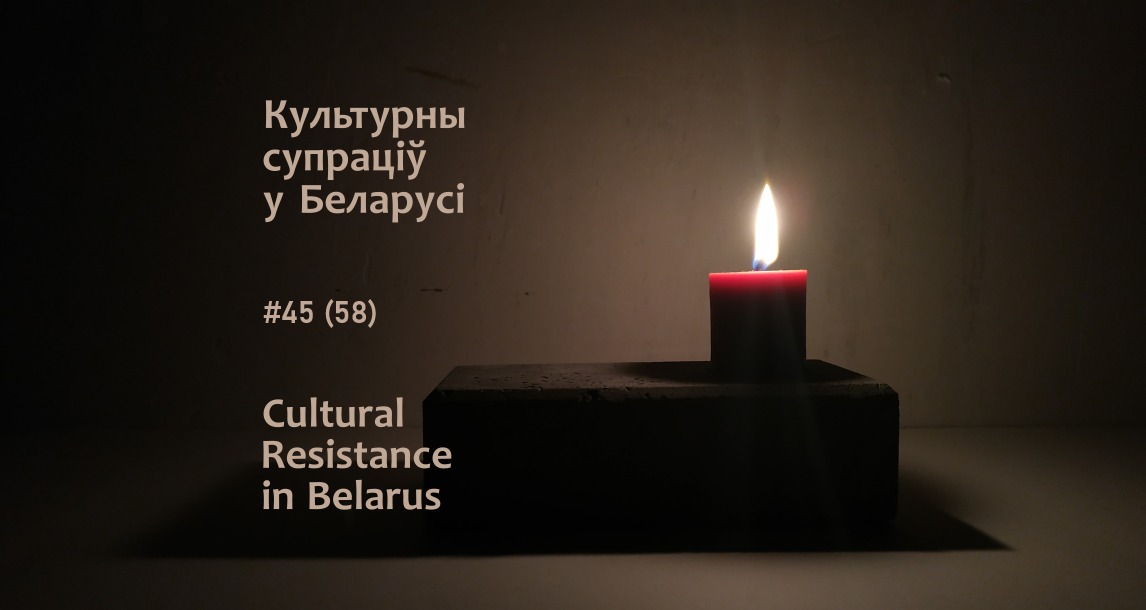
Download the pdf-version of issue 58 of Cultural Resistance Monitoring
Persecution, Convictions, Censorship, Cultural Policy
The Supreme Court of Belarus has decided to liquidate the Francysk Skaryna Belarusian Language Society.

Prisoners in the detention centers were restricted in their subscription to newspapers and magazines: now their relatives and friends cannot subscribe them to any printed media, it can be done exclusively by the pre-trial detention center staff at the expense of the prisoners’ personal accounts.
Mikoła Dziadok, a politically imprisoned blogger and author of the book Paints of the Parallel Universe, detained on November 11, 2020, received 5 years in a penal colony “for participating in riots”, “for storing fuels” and “for distributing materials on the Internet.”
Fiodar Čarankoŭ, vocalist of the Nia Varta band was detained, his house was searched and police confiscated computers. The reason for the detention is believed to be his subscription to an Instagram account, which was recognised as “extremist”.
Life of the Imprisoned People
Ihar Bancer, a political prisoner and musician, received a translation of the Liverpool anthem into the Belarusian language made by Andrej Alaksandraŭ, a political prisoner, journalist and poet. Later it also became known that Ihar was given another 10 days in punitive confinement.
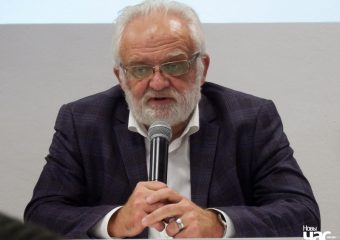
Uładzimir Mackievič, a political prisoner, philosopher, methodologist, educator and a member of PEN Belarus, who is accused of “organizing and preparing actions that grossly violate public order,” has been in jail for over 100 days. His texts are studied for the presence of hostility in them. Mackievič himself is convinced that he was arrested for criticizing the Łukašenka’s regime. In prison he gives lectures to his cellmates and writes a book. To support Uładzimir, his colleagues have launched a Philosopher in prison civil campaign and publish news about him, as well as his texts and ideas. His colleague Taćciana Vadałažskaja shared,
“He is alright given the circumstances. He misses air and space for walks and reflections. Now he seeks to devote all of his free time to work on philosophical, reflective texts. He keeps thinking about what and how should be done to get through the political crisis.”
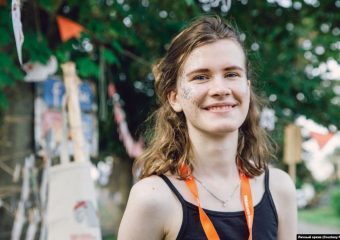
November 12 marked a year since the detention of student activists. 12 participants of the “student case” were sentenced to 2 to 2.5 years in prison for “organizing and preparing actions that grossly violate public order, or active participation in them.” Among them are Kasia Budźko, Maryja Kalenik (artists) and Ksienija Syramałot (poet).
Pavieł Sieviaryniec, a politically imprisoned politician and writer, continues to work on new novels behind bars: they are Belarusalim, Tree of Life and Jesus Christ speaks Belarusian.

It has become known that Maryja Kaleśnikava, a politically imprisoned musician and activist, has been kept in solitary confinement for almost eight months. She sees this not only as pressure on her, but also a violation of her rights. According to the law, solitary confinement is a form of punishment.
Alaksandr Fiaduta, Doctor of Philology, writer, editor, translator, literary critic, publisher and member of PEN Belarus, organized a “prison university” for his cellmates. They read classics, listen to Alaksandr’s lectures and discuss what they read together.
Dissent and Cultural Activism
An online discussion on the topic Path to Non-Freedom of the Intellectual Club of Sviatłana Aleksijevič, a Belarusian Nobel Prize laureate in literature and the chairperson of PEN Belarus, was held.
A new episode of literary discussion Context with Hieorhij Lichtarovič about Karatkievič and Zianon Paźniak, Collection of Monuments and people of Belarusian past has been published.

An exhibition dedicated to the 455th anniversary of the second Statute of the Grand Duchy of Lithuania has opened at the National Library of Belarus. The Statutes of the Grand Duchy of Lithuania are famous legislative acts that have become exceptional documents in the history of the whole Europe.
Dźmitry Strocaŭ, a poet and a member of PEN Belarus, won the Kurt Tucholsky Prize from Swedish PEN.
A collection of ballads Lieutenant Piatrovič and Ensign Zdań by Uładzimir Arłoŭ was translated into Polish by Bahdan Zadura and published by the Lublin publishing house Varštaty kultury.
A book trailer for Tania Skarynkina’s book District Center, a shortlist for the 2021 Jerzy Giedroyc Literary Award, has been released.
Botanic project presented an acoustic version of the song Save on Majdan Niezaležnaści (Ukr. Independence Square) in Kiev.
Šura Pilipovič-Suščyc, a photographer of Nasha Niva media, took second place in the “Conflict” category of the Direct View photo contest held by the Sacharaŭ Center with her Stolen People project. It includes collages about Belarusian politically imprisoned cultural figures and their families as well.
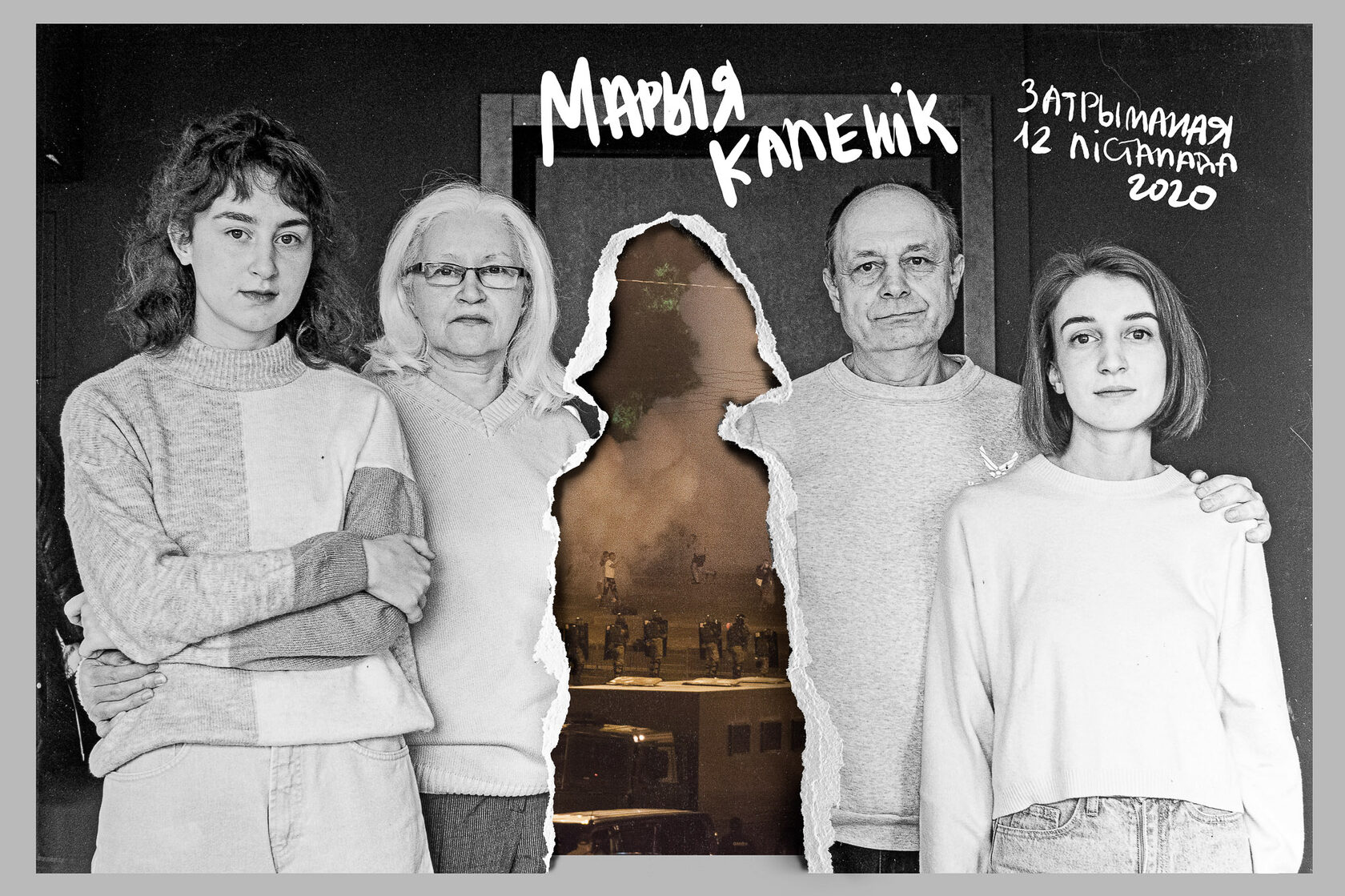
In one of his letters, Valancin Stefanovič, a human rights activist imprisoned since July 14 for “organizing actions that grossly violate public order and tax evasion,” said that he drew the adventures of a cat in prison, but the censor did not let the drawing through. The Human Rights Center “Viasna” called on people to send them their pictures of a “Cat at the Valadarka prison” and received 19 illustrations in a month from people of different ages and from different countries. The drawings were made by children and students, from Italy and Russia, and even by other political prisoners.
A new issue of the literary magazine Dziejasłoŭ by the Union of Belarusian Writers has been published.
On November 11, as a part of this year’s Jerzy Giedroyc Literary Award an online discussion Mass Uprising: What Does Giedroyc and Belarusian Literature Offer to the Reader? was held with Nasta Hryščuk, a literary critic, and Nasta Karnackaja, a literary reviewer.
The Knigazbor publishing house has released a Calendar in Belarusian with pictures and words for each day of the year.
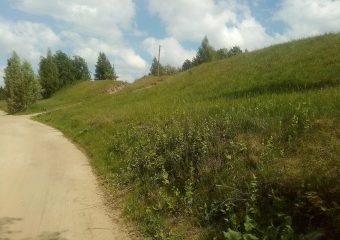
Jaŭhien Malikaŭ, a Homel historian and with a research doctorate in art history, calls for saving the ancient Milagrad culture settlement known as the Swedish hill. A district is planned to be built in the immediate vicinity of the archeological monument.
The Free Theater is preparing a new play called Gloomy Sunday about the events of August 2020. The troupe was forced to leave Belarus because of repressions.
Mikałaj Chalezin, art director of the Belarusian Free Theater, together with Siarhiej Budkin, head of the Belarusian Council for Culture, Andrej Kurejčyk, playwright, and Natalla Zadziarkoŭskaja, NAU representative for culture, held a discussion on the cultural policy of New Belarus.
Alaksandr Filipienka, Sviatłana Aleksijevič, Alhierd Bacharevič, Julija Cimafiejeva, writers, as well as Alaksiej Pałujan, director, together with Sviatłana Cichanoŭskaja discussed modern culture and its development in free Belarus at a round table. Before the discussion Julija Cimafiejeva read her poems and Alaksiej Pałujan showed excerpts from his film Courage about the events of August 2020.
The debut album Słova (Bel. for Word) by a Belarusian artist Palina Dabravolskaja (Chornabrova) has been released.
The Belarusian Warsaw Freedom Orchestra and the Lity Taler band dedicated a bagpipe performance to political prisoners from the Irdorath band, who are being held in a Belarusian prison.
An online exhibition of the international project Voices of Violence tells the stories of women from Belarus, Denmark, Iceland, Estonia, Latvia and Lithuania about their experiences of sexual violence, sexism or other forms of gender-based violence.
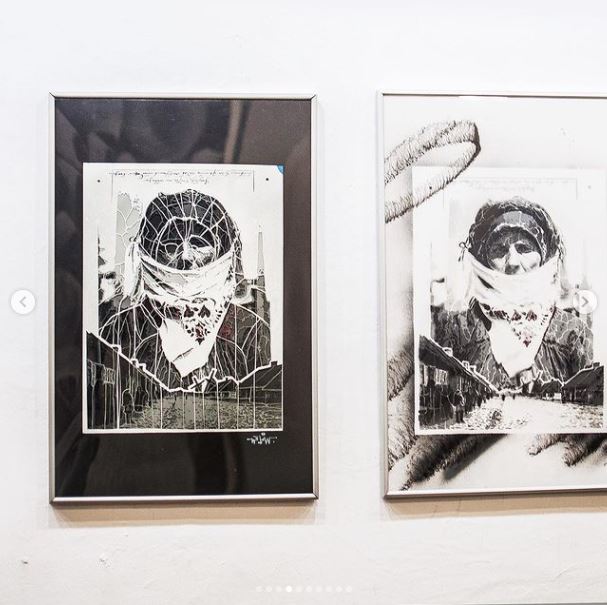
An exhibition of urban artists and Julija Savič, a photographer of the Vulica Brasil urban festival, is being held in the Vieršy Kult cultural space in Minsk. Apart from a painted wall and banners, which create special photo areas, the exhibition presents works in various techniques from painting to stencil as well.
The exhibition Artificial Coma displayed the works of students of the Belarusian Academy of Arts in Warsaw until November 13. It reflects on how the protests affected young people and their work. The exhibition can be seen online.
The Belarusian Council for Culture announced an open call for participants for individual art residencies. To apply, fill out the form by November 24 and attach the necessary documents.
Małanka and Andrej Kurejčyk, director and screenwriter, organized a casting for a new film about current events in Belarus.
A new book Wind is nothing and an echo of darkness by Ihar Kulikoŭ, poet and translator, has been published.
A Belarusian film festival Bulbamovie, which takes place in Poland, started on November 12. The organizers said,
“We came out of the woods like partisans, and our mission is to return Belarusian movie industry to Minsk in a year or two at most.”
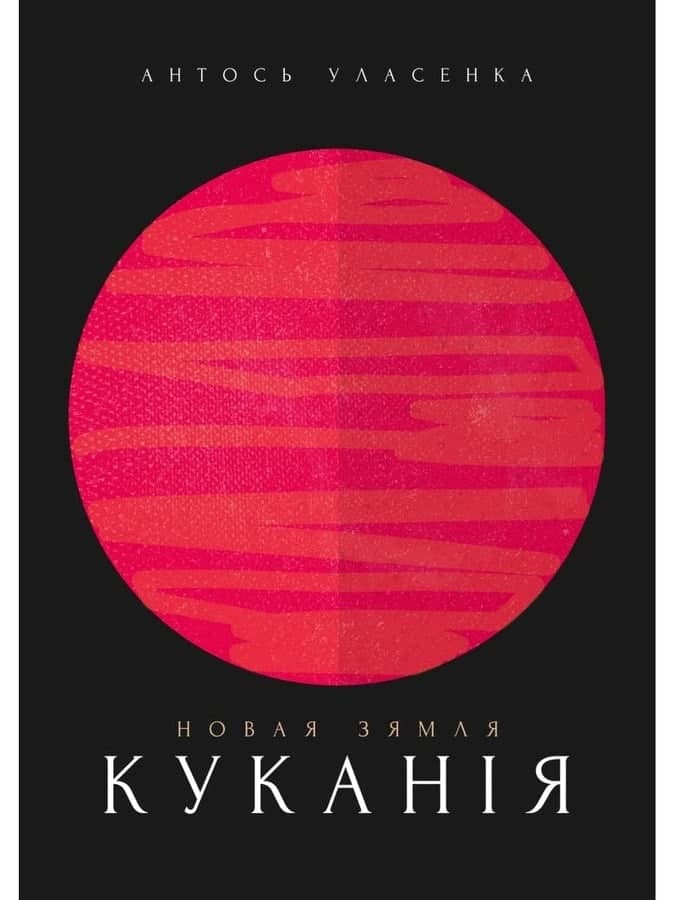
The Belarusian language support platform has launched a new marathon Language of the profession to promote the Belarusian language in service industry, call centers, medical facilities, cafes, shops, gas stations, IT and even brewing.
Marharyta Laŭčuk and Andrej Pavuk, musicians, made a cover of the song Golden bars by the Novaje Nieba band (lyrics by Anatol Sys, a belarusian poet). They dedicated this song to the memory of Raman Bandarenka, an artist who died after being beaten by unknown persons believed to be plain-clothed police officers.
Antoś Ułasienka has published his debut book New land. Kukanija.
A new magazine Dash has been created. The pilot issue contains stories, translations, photographs and poems.
Rusłan Kulevič, a journalist and writer, published a book about life in Hrodna in the 1930s and 1940s based on the memoirs of 89-year-old Stanisłava Rumoŭskaja.
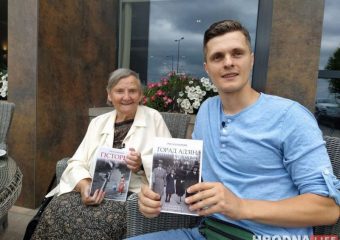
A media about young people in Belarus WeTalk has created a new special project 12 about the bravest student activists. Among them are Kasia Budźko, Maryja Kalenik (artists) and Ksienija Syramałot (poet).
Zmicier Bartosik, a bard and a writer, had a concert in Warsaw.
Ksiša Anhiełava, a Belarusian artist and an icon painter, granddaughter of Nikanor Jaraševič, the repressed first rector of the Belarusian National Technical University, painted 200 portraits of people who were imprisoned for their civil position in the past year.
Voices of Belarusian Culture
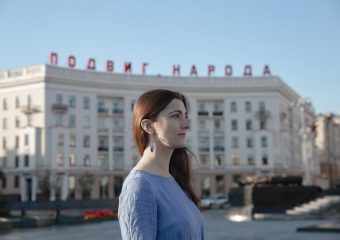
Hanna Komar, a poet, translator and a member of PEN Belarus, spoke about the influence of protests in her work,
“When protests first started, the editor of my English translations, Mary Colar – an American poet, asked, ‘Annie, how are you going to heal the wounds of your people? You’re a writer, you’re going to have to do this.’ And I can actually see how I went from personal experience to the experience of the whole country, how it intertwined inside me.”
Aleś Bialacki, a politically imprisoned member of PEN Belarus and a human rights activist detained for almost four months for alleged “tax evasion,” in his letter to a Belarusian,
“The beauty of October was visible from the window as well. The sun blindingly shone on the tower.”
Alena Anisim, chairman of the Francysk Skaryna Belarusian Language Society, on the eve of the court hearing,
“Even if the Francysk Skaryna Belarusian Language Society ceases to exist, people still will exist.”

Andrej Skurko, a political prisoner and author of the Naša Niva newspaper and Naša Historyja (Bel. Our History) magazine, as well as traveling notes, fairy tales, poems, and comic book scripts for children, sent a letter to his wife from Valadarka prison,
“I thought that our situation should never be perceived as a tragic accident, an evil fate, etc. This is not a coincidence, but rather a regularity. This is what time has for us now and this is how we live now, other times will come – and everything will change. I ask you to find reasons for joy and don’t worry about me.”
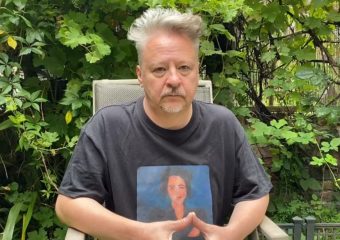
Mikałaj Chalezin, art director of the Belarusian Free Theater,
“The Ministry of Culture must abandon the role of patrons, the role of dividing money on the sidelines in opacity. In most countries, such institutions deal with heritage preservation. As for the artists who want to receive state funding, they must participate in the distribution of creative grants on a competitive basis.”
On the anniversary of the death of Raman Bandarenka, an artist who died after being beaten by unknown persons believed to be plain-clothed police officers on the night of November 11-12, 2020, his sister Volha Kučarenka, a designer, gave an interview,
“…I am sure that one day justice will prevail. My brother’s death has led to many events that help to open our eyes to what is really happening.”
Despite a number of independent investigations, the Prosecutor General’s Office suspended the criminal case in September, explaining that they had not been able to identify the person involved in the murder.
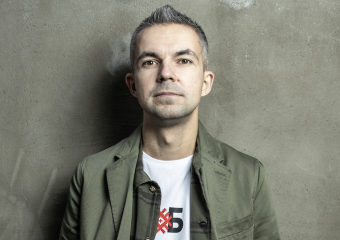
Saša Filipienka, a writer, believes that Belarusians will spend the next ten years working on their traumas of 2020 and speaks about his new play,
“To deal with my feelings somehow, I wrote a play about a trial of a medical doctor who refused to treat a riot policeman. Events unfolding onstage explain the behavior of this doctor, and at the end of the performance, the audience votes on what the verdict should be and whether the defendant should be tried at all. The production of this play has already been forbidden in Russia.”
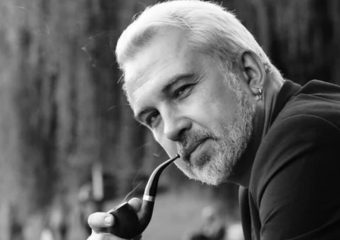
Alhierd Bacharevič, writer,
“Over the last year that Julija Cimafiejeva, my wife, poet and I have lived outside Belarus, we have received so much attention to our work, so many invitations to festivals and performances, as we have never had before. We gave 70 interviews to the Western media during this year. We denied not one. Was such a horror that happened in our country indeed necessary to draw attention to Belarus?! We gain more visibility, so we see our mission, the mission of those who have left the country and have the opportunity to speak publicly to tell about Belarus. We must use our authority, our voice, so that the world does not forget about us. Belarus is Europe as well, we must accept it and talk about it to the whole world. We are not an exotic and not a sunken continent.”
Lavon Volski, a Belarusian musician and PEN Belarus member, shared in an interview,
“Belarus is now a country of great hope <...> There were serious casualties, and they didn’t happen for no reason. The people have understood and continue to reflect on what is happening.”
International Solidarity
On November 8, a seminar on Belarusian writers and cultural figures during protests was held in Gothenburg, Sweden, with the participation of the Kryły Chałopa theater troupe.
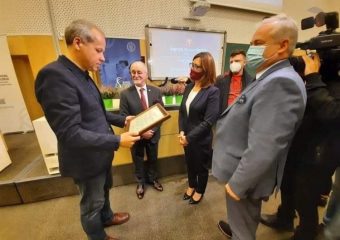
The Leu Sapieha prize was awarded to Kaciaryna Kryvičanina and Ihar Mielnikaŭ, Belarusian researchers, in Bialystok. The purpose of the award is to honor individuals who have made a significant contribution to the development of civil society in Belarus and the formation of an independent and democratic Belarus in view of the common history of Poland and Belarus.
A presentation of the book Belarus on the Way to Freedom by Adeła Dražanava and Tereza Šupava, Czech journalists, took place in the Václav Havel Library in Prague on November 8. The book explains to the Czechs what today’s Belarus actually is.
International PEN demands to unblock the PEN Belarus website.
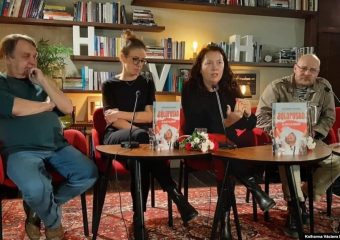
More than 4,000 Czechs signed the petition initiated by Amnesty International for the release of Maryja Kaleśnikava, a Belarusian activist and musician.
Belarusians of the world took part in actions in memory of Raman Bandarenka, an artist. The actions took place in numerous cities of Belarus, Great Britain, Poland, Georgia, Ukraine and other countries. Peter Stano, the official representative of the European External Action Service, spoke about the anniversary of the death of Raman Bandarenka on his twitter,
“The European Union continues to work for justice for victims and to hold those responsible to account. The regime must stop the repressions and release all political prisoners.”
Jury Dudź, a popular Russian journalist and interviewer, released an interview with Słava Kamisaranka, a Belarusian stand-up comedian, and shared a music video to the song Miesiac (Bel. Moon) by the Belarusian singers Palina and Ketevanon on his Instagram.
Valžyna Mort wrote a letter to Ałana Hiebramaryjam, a politically imprisoned activist from the “student case”, in which she sent a greeting from Maaza Mengiste, a famous Ethiopian writer,
“Yesterday I told Maaza Mengiste about you, a well-known and respected writer from Ethiopia who lives in New York. Maaza asked me to tell you that she knows you and worries about you, and she sends her support and respect to you and other detained students”.
Political Prisoners’ Birthdays
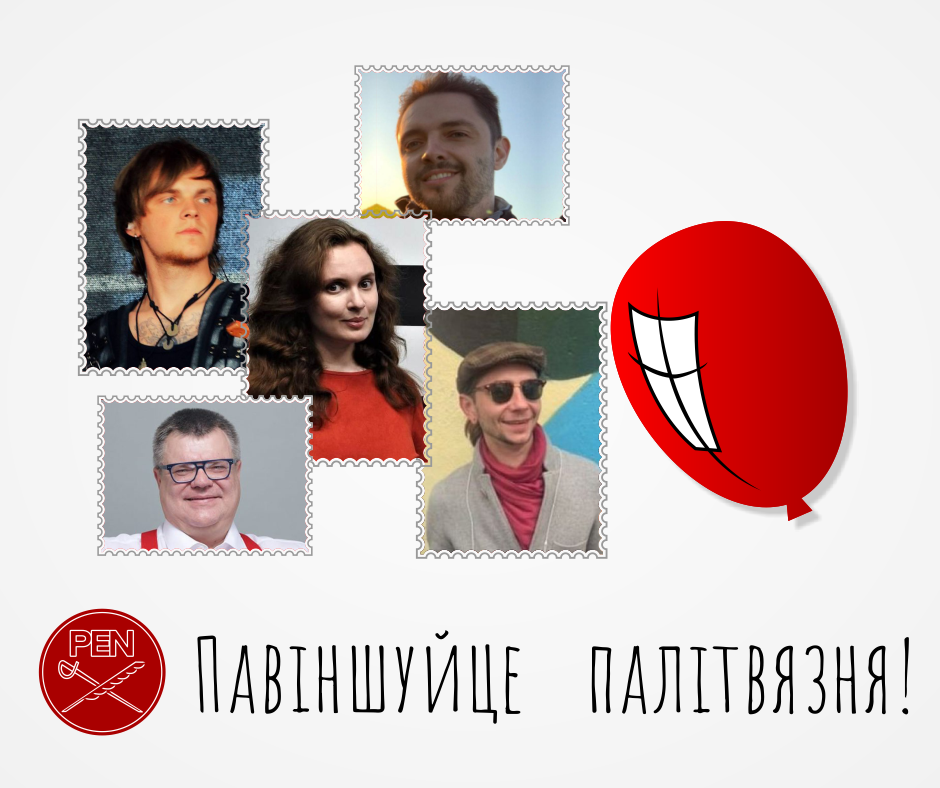 For November 14, 843 persons have been recognized as political prisoners in Belarus, and the number has been increasing steadily. This, of course, shows that repression by the authorities not just hasn’t stopped, but is actually gaining strength.
For November 14, 843 persons have been recognized as political prisoners in Belarus, and the number has been increasing steadily. This, of course, shows that repression by the authorities not just hasn’t stopped, but is actually gaining strength.
PEN Belarus, as an association of writers, is particularly concerned about the fate of cultural workers who have been unjustly imprisoned.
In November, 5 political prisoners somehow involved in the process of cultural development of our country, will celebrate their birthdays behind bars. They are:
Anton Šnip, musician (November 1); Kaciaryna Andrejeva, journalist, writer (November 2); Viktar Babaryka, patron of arts (November 9); Ihar Jarmołaŭ, dancer (November 15) and Maksim Kruk, scene designer (November 16).
Letters and postcards (in Belarusian or Russian) can be sent to the following address:
Anton Šnip (Антон Шніп) and Maksim Kruk (Максім Крук): СІЗА-1. 220030, г. Мінск, вул. Валадарскага, 2;
Kaciaryna Andrejeva (Кацярына Андрэева): ПК №4. 246035, г. Гомель, вул. Антошкіна, 3;
Viktar Babaryka (Віктар Бабарыка): ПК №1. 211440, г. Наваполацк, вул. Тэхнічная, 8;
Ihar Jarmołaŭ (Ігар Ярмолаў): ПК №17. 213004, г. Шклоў, вул. 1-я Заводская, 8.
